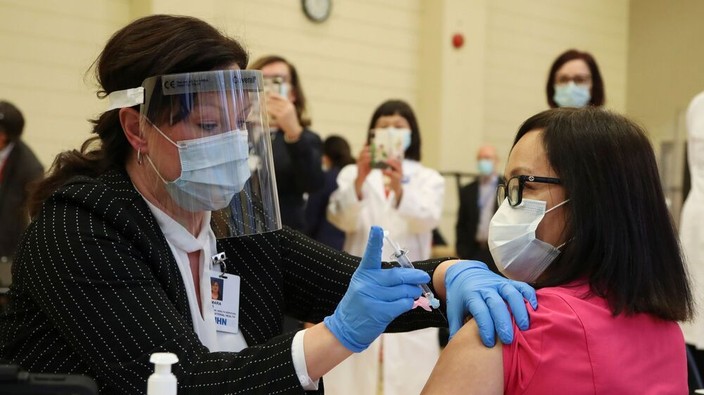the process of vaccinating
canadians against covid-19 has begun. with the rise in
vaccine hesitancy, and many refusing even to wear masks, people are wondering whether covid-19 vaccination could be mandatory.it could, in particular contexts. one is the workplace, through employer policies. another is through legislation. however, neither possibility is simple or straightforward.
workplace policiesemployers have many reasons to consider mandatory vaccination. one reason is their legal duty to take “
every reasonable precaution” to create a safe working environment.while that duty compels some pandemic-related directives, there is
disagreement about whether a vaccination policy is among them. either way, any subsequent policy would be subject to certain considerations.the main consideration would likely be human rights legislation, which protects employees against discrimination on specified grounds. a mandatory vaccination policy has implications for those for whom a
medical condition or religious belief makes vaccination untenable.while there is no absolute right to accommodation, employers have a significant duty to make efforts to find an accommodation that is reasonable in the circumstances. a demonstrated medical need or sincere religious belief will not necessarily trump a workplace policy. rather, employers must accommodate to the point of “undue hardship.”what constitutes undue hardship depends on the facts, as does what form a reasonable accommodation could take. if an employee with a valid claim can work from home (an increasingly plausible prospect), a refusal to allow this as an accommodation could violate human rights law. in other cases, a mask might be deemed sufficient accommodation.legal concerns aside, accommodation, specifically for those with a medical need, just makes sense. that’s because one argument for widespread vaccination is to achieve
herd immunity, that can protect those who aren’t vaccinated.importantly, applicable human rights law doesn’t recognize all grounds upon which one might refuse vaccination, so the bigger question regards so-called “conscientious” refusal, such as concerns about vaccine safety and/or efficacy. because such grounds are unprotected by the relevant human rights legislation, they likely won’t find much traction.
management rights in unionized workplacesin unionized workplaces, employer policies are subject to further considerations — namely collective agreement language, and a
reasonableness test. there are many things that may render a policy unreasonable, such as whether the intrusion into employee privacy by collecting personal health information is outweighed by the benefit of doing so.a mandatory covid-19 testing policy for employees of a retirement home
was recently upheld on the basis that the intrusion into privacy was justified, despite the fact that other safety measures were already in place and no outbreak had yet occurred.in arriving at this conclusion, the arbitrator noted that testing was invasive and imperfect but the consequences of an outbreak were more dire.by contrast, arbitrators have previously been divided about employer policies concerning seasonal flu vaccination, with some arbitrators finding them to be reasonable,
while others have disagreed. again, decisions are fact-dependent. the fact that covid-19 is a much deadlier virus than seasonal flu, and that current vaccines are
much more effective, matters.collective agreement language, too, is relevant. in cases where workplace vaccination policies have not been upheld, language in the agreement permitting vaccine refusal was a factor.
laws could require vaccinationmandating vaccination through laws is another possibility. previously, attempts to do so have mostly,
but not only, been concerned with admission to schools.existing school-entry vaccination laws, however, allow parents to easily obtain exemptions. vaccination, in fact, is not actually mandatory for school admissions. the most recent attempt to limit these exemptions to cases of medical need was narrowly defeated
earlier this year in new brunswick.lacking the political will to mandate vaccines, however, is not the same as lacking authority to do so should political winds shift.ontario’s health minister recently stated that people will receive
proof of covid-19 vaccination, anticipating situations that will require documentation — including travel. notably, in august, transport canada issued a directive requiring
proof of medical exemption before boarding a plane without a mask. implicit in this directive is that non-medical reasons for mask refusal are unacceptable.any similar law allowing only medically based exemptions from vaccination (for travel or school entry, for example) would certainly be challenged in court under canada’s charter of rights and freedoms. a recent charter challenge to newfoundland and labrador’s travel restrictions
was unsuccessful, but other challenges to various
lockdown measures are underway.unlike provincial human rights laws, the charter protects matters of “conscience.” but that doesn’t mean a mandatory vaccination law is doomed to fail if challenged.a well-crafted law could be defended as proportional, all things considered. the charter itself allows for a “
balance between the rights of the individual and the interests of society.” pandemic considerations could tilt that balance in favour of deference to government decision-making.
persuasion or mandates?people have a legal right to
refuse medical treatment. but this right is not necessarily violated by denial of access to communal spaces due to that refusal.with that said, the pandemic, far from being the crisis that has us all pulling in the same direction, has
heightened societal rifts.in that context, the
ongoing debate over whether mandates or persuasion is a better vehicle for increasing vaccination rates is taking on an increased urgency.
alison braley-rattai, assistant professor, labour law, brock university.this article is republished from the conversation under a creative commons license. read the original article.
 4 minute read
4 minute read









